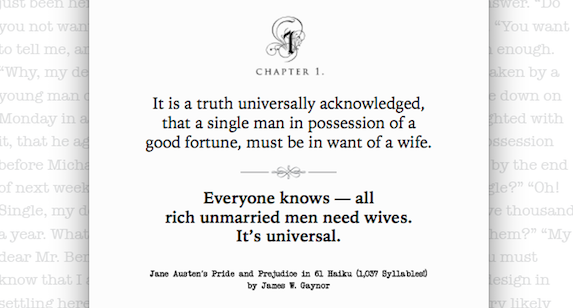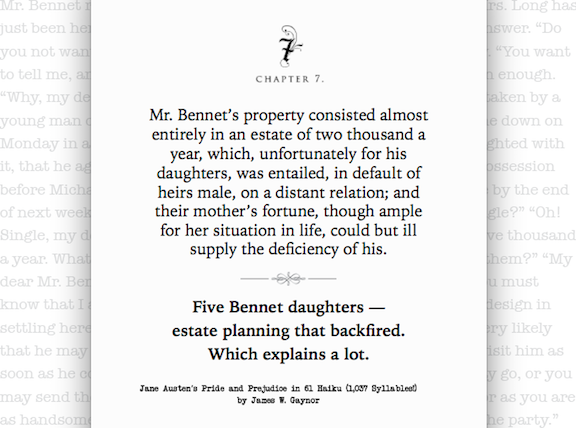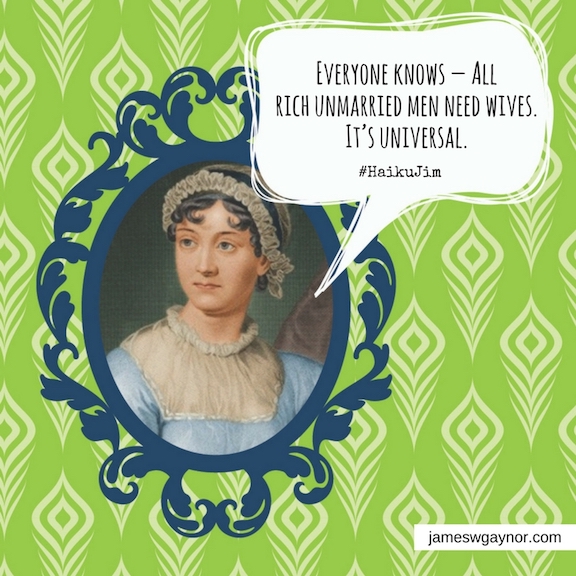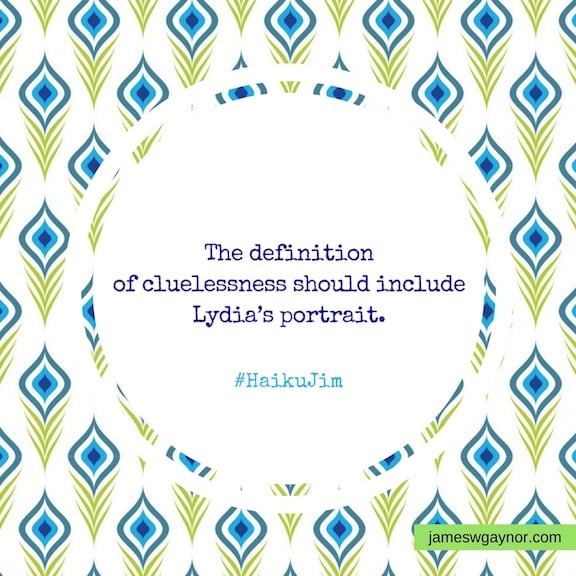Pride and Prejudice in 61 Haiku (1,037 Syllables!): The Flutter Effect
By Taylor Jasmine | On December 5, 2017 | Updated May 9, 2023 | Comments (1)

Contributed by James Gaynor, author of Jane Austen’s Pride and Prejudice in 61 Haiku (1,037 Syllables!): In my last post on this site, I shared three things I learned writing Pride and Prejudice in 61 Haiku (1,037 Syllables!) Shortly after that appeared, I was invited to Fordham University to talk to English Literature majors about my take on the poetry / intent of the 61 chapter-opening lines of Pride and & Prejudice.
I found the students particularly responded to my point about Austen’s use of “flutter” in the first line of Chapter 43.
. . . . . . . . . .
Chapter 43 (The flutter effect)
Elizabeth, as they drove along, watched for the first appearance of Pemberly Woods with some perturbation; and when at length they turned in at the lodge, her spirits were in a high flutter.
Elizabeth Bennet, as we all know is not a flutterer — and this is the only time in the book the world appears to describe her. Why use a word more familiarly reserved for heroines who find themselves about to sweep from a sudden attack of love at first sight?
Because this is when Austen reveals that Elizabeth has fallen in love with Darcy — not because of any romantic Colin-Firth-in-a-wet-shirt moment but as she begins to realize the sense of order Pemberley represents, the purpose Darcy fulfills as its master — and what it might mean to join him in his duties.
Elizabeth has indeed fallen in love at first sight and therefore is in a “high flutter” — but the object of her emotion is a stately home, order established by architecture, coming into view as she drives through the untamed (albeit contained) nature of Pemberly Woods.
. . . . . . . . . .
. . . . . . . . . .
An unromantic interpretation
In light of this decidedly unromantic interpretation of how and when Elizabeth fell in love with Darcy, I was able to share one of my favorite Austen quotes (letter to her sister, Cassandra (Steventon, 27 November 1798):
“Mrs. Hall, of Sherborne, was brought to bed yesterday of a dead child, some weeks before she expected, owing to a fright. I suppose she happened unawares to look at her husband.”
Given the high mortality of childbirth in the late 18th century, Austen’s attitude is not particularly remarkable — yet it does reveal a less-than-empathetic view of life. For me, this is the voice that comes through, particularly in Pride and Prejudice’s chapter-opening lines, and it is important characteristic to remember when discussing her work.
After the Fordam lecture, one young woman told me the tone of the narration we discussed in light of the above quote was exactly the voice she needed guiding her love life. All of which confirms for me that, 200 years after her death, Austen continues to exert her subtle, ironic influence. But first, we have to get past Colin Firth and his wet shirt …
. . . . . . . . . .
. . . . . . . . . .
About the author
James W. Gaynor (#HaikuJim) is a poet, artist, editor, and writer. A graduate of Kenyon College, he lived in Paris, where he taught a course on Emily Dickinson at the University of Paris, studied the development of the psychological novel in 17th-century France, and worked as a translator.
After returning to New York, Gaynor worked as an editor at Grosset & Dunlap, Cuisine magazine, Scriptwriter News and Forbes Publications. His articles, book reviews, poems and essays have appeared in The New York Observer, The Gay and Lesbian Review Worldwide, Peeking Cat Poetry Magazine, and Peeking Cat Anthology 2017.
As #HaikuJim, Gaynor is a regular columnist for OTVmagazine.com, where his haiku commentaries have a devoted following. His collection of poetry, Everything Becomes a Poem, was published in 2016 (Nemeton Press) and won the 2017 American Graphic Design Award for its creative interplay of design and text.
He also leads a haiku workshop (Can You Haiku?), which uses 17th-century Japanese poetry techniques to improve digital communications. Jane Austen’s Pride and Prejudice in 61 Haiku (1,037 Syllables!)is his latest book (Nemeton Press).
. . . . . . . . . .




novel approach, well done